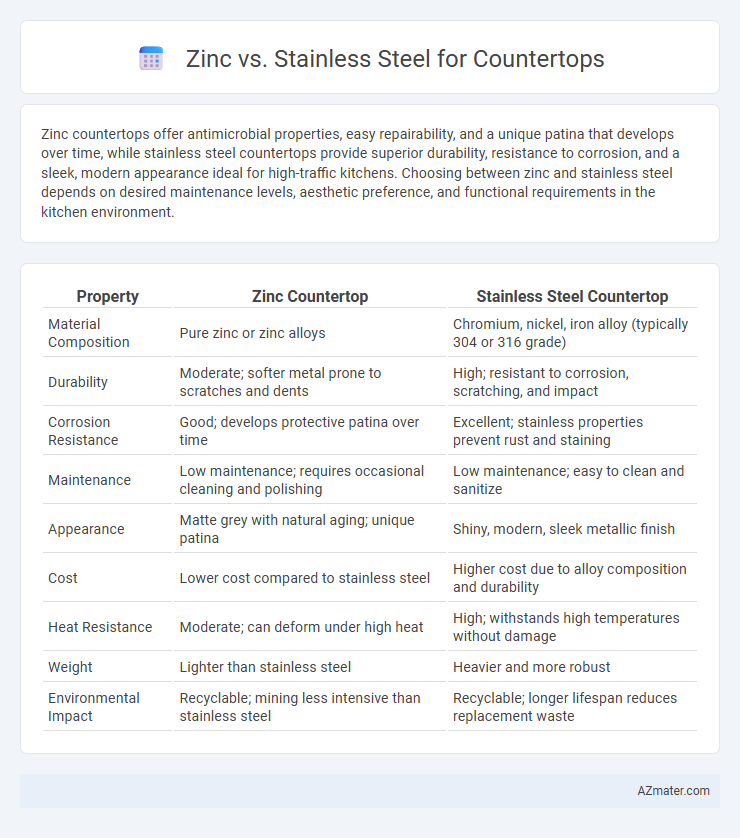Zinc countertops offer antimicrobial properties, easy repairability, and a unique patina that develops over time, while stainless steel countertops provide superior durability, resistance to corrosion, and a sleek, modern appearance ideal for high-traffic kitchens. Choosing between zinc and stainless steel depends on desired maintenance levels, aesthetic preference, and functional requirements in the kitchen environment.
Table of Comparison
| Property | Zinc Countertop | Stainless Steel Countertop |
|---|---|---|
| Material Composition | Pure zinc or zinc alloys | Chromium, nickel, iron alloy (typically 304 or 316 grade) |
| Durability | Moderate; softer metal prone to scratches and dents | High; resistant to corrosion, scratching, and impact |
| Corrosion Resistance | Good; develops protective patina over time | Excellent; stainless properties prevent rust and staining |
| Maintenance | Low maintenance; requires occasional cleaning and polishing | Low maintenance; easy to clean and sanitize |
| Appearance | Matte grey with natural aging; unique patina | Shiny, modern, sleek metallic finish |
| Cost | Lower cost compared to stainless steel | Higher cost due to alloy composition and durability |
| Heat Resistance | Moderate; can deform under high heat | High; withstands high temperatures without damage |
| Weight | Lighter than stainless steel | Heavier and more robust |
| Environmental Impact | Recyclable; mining less intensive than stainless steel | Recyclable; longer lifespan reduces replacement waste |
Introduction to Zinc vs Stainless Steel Countertops
Zinc and stainless steel countertops offer distinct advantages in durability and aesthetics for modern kitchens. Zinc provides a unique patina over time, enhancing its natural antimicrobial properties, while stainless steel is renowned for its resistance to heat, stains, and corrosion. Choosing between zinc and stainless steel depends on preferences for maintenance, style, and long-term wear.
Material Composition and Properties
Zinc countertops consist primarily of pure zinc, a soft, malleable metal known for its natural antimicrobial properties and resistance to corrosion, making it ideal for kitchen environments. Stainless steel is an alloy composed mainly of iron, with chromium (typically around 10.5% or more) providing excellent rust resistance, along with nickel and other elements that enhance durability and strength. Zinc offers a unique patina over time due to oxidation, while stainless steel maintains a sleek, shiny surface resistant to stains and heat.
Durability and Resistance to Wear
Zinc countertops offer moderate durability with excellent resistance to corrosion and antimicrobial properties, making them suitable for environments where hygiene is crucial. Stainless steel provides superior durability and exceptional resistance to wear, scratches, and heat, ensuring longevity even under heavy daily use. Both materials resist stains, but stainless steel outperforms zinc in maintaining a pristine appearance over time due to its tougher surface.
Aesthetic Appeal and Design Versatility
Zinc countertops offer a warm, matte finish that develops a unique patina over time, providing an organic, rustic aesthetic appealing to vintage and farmhouse designs. Stainless steel countertops deliver a sleek, reflective surface, enhancing modern and industrial kitchens with high durability and easy maintenance. Both materials offer design versatility, with zinc allowing for customized shaping and aging effects, while stainless steel supports seamless integration with appliances and backsplashes.
Maintenance and Cleaning Requirements
Zinc countertops require regular sealing to prevent oxidation and maintain their smooth patina, while stainless steel is highly resistant to stains and corrosion, needing only routine cleaning with mild detergents. Zinc is softer and more prone to scratches and dents, necessitating gentle cleaning tools to avoid surface damage, whereas stainless steel withstands abrasive scrubbing and can be sanitized with disinfectants. Both materials offer unique maintenance benefits, but stainless steel generally provides a more durable and low-maintenance option for busy kitchen environments.
Cost Comparison and Long-Term Value
Zinc countertops typically cost between $70 to $150 per square foot, making them more affordable upfront compared to stainless steel, which ranges from $100 to $250 per square foot due to its durability and premium finish. While stainless steel offers superior resistance to heat, stains, and corrosion, zinc's softer surface develops a unique patina over time, enhancing its aesthetic appeal but requiring more maintenance. Long-term value favors stainless steel for high-traffic kitchens due to its longevity and minimal upkeep, while zinc may suit budget-conscious remodels seeking a vintage or industrial look with moderate durability.
Environmental Impact and Sustainability
Zinc countertops offer a lower environmental impact due to their recyclability and energy-efficient production compared to stainless steel, which requires high-energy intensive processing and mining. Zinc's natural antimicrobial properties reduce the need for chemical cleaners, supporting sustainable maintenance practices. While stainless steel is highly durable and recyclable, zinc's renewable sourcing and biodegradability position it as a more sustainable option for eco-conscious kitchen design.
Suitability for Different Kitchen Styles
Zinc countertops offer a rustic, vintage appeal ideal for farmhouse and industrial kitchen styles due to their natural patina and soft texture that develops character over time. Stainless steel countertops suit modern, minimalist, and professional kitchens, providing a sleek, durable, and hygienic surface that resists heat and staining. Choosing between zinc and stainless steel depends on the desired aesthetic as well as the practical needs of the kitchen environment.
Pros and Cons of Zinc Countertops
Zinc countertops offer exceptional antimicrobial properties and develop a unique patina over time, enhancing their aesthetic appeal and durability. They are softer than stainless steel, making them more prone to dents and scratches but easier to repair without specialized tools. While zinc provides a warm, natural look, it requires regular maintenance to prevent oxidation and can be more expensive than stainless steel options.
Pros and Cons of Stainless Steel Countertops
Stainless steel countertops offer exceptional durability and resistance to heat, stains, and corrosion, making them ideal for high-traffic kitchens and professional culinary environments. Their non-porous surface ensures easy cleaning and prevents bacterial growth, contributing to a hygienic workspace. However, stainless steel can be prone to visible scratches, dents, and fingerprints, which may require regular polishing to maintain its sleek, modern appearance.

Infographic: Zinc vs Stainless Steel for Countertop
 azmater.com
azmater.com